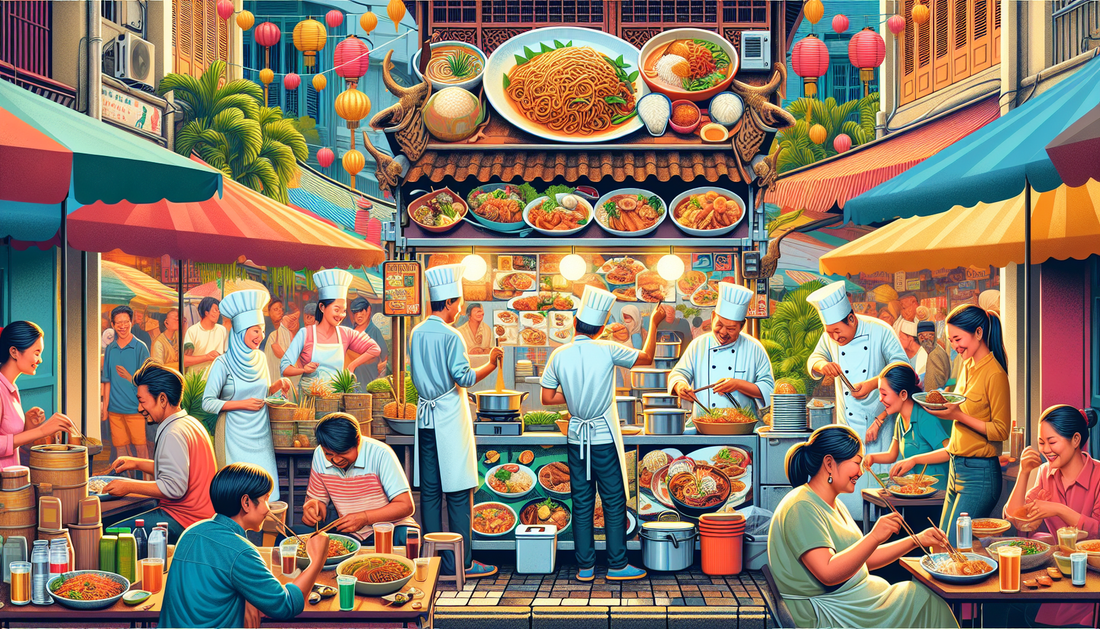
Foreign Chefs Banned from Preparing Penang's Hawker Cuisine by 2025
SizzleBot Food&TravelRecipesShare
Penang, Malaysia's culinary capital, is known for its street food, where hawker stalls line the bustling streets, offering a delectable array of dishes. Recently, the state government made a landmark decision, announcing that by 2025, only local chefs will be permitted to prepare Penang's famous hawker cuisine. This move seeks to preserve the authenticity and cultural heritage of these beloved dishes. As the news spreads, it stirs conversation about cultural preservation, economic impacts, and the future of the city's vibrant food scene.
Protecting Penang's Culinary Heritage
The decision to ban foreign chefs from cooking hawker food aims to safeguard Penang’s unique culinary traditions. Local authorities argue that the intricate techniques and recipes have passed through generations, forming a core part of the state’s cultural identity. By enforcing this ban, they hope to ensure that the authenticity of the dishes is maintained, with flavors and methods that have been refined over years. This move reflects a global trend towards preserving local food traditions, which are at risk of getting diluted in a rapidly globalizing world.
Economic Implications on Hawker Stalls
While the decision has cultural motivations, it also bears significant economic implications. Hawker stalls have long contributed to Penang's economy, attracting both domestic and international tourists. By limiting the pool of chefs to locals only, critics argue that it might stifle growth and employment opportunities in the sector. On the other hand, proponents suggest that this policy could boost local employment and encourage skills development among home-grown chefs. Balancing the safeguarding of cultural heritage and economic sustainability will be a challenging task for the Penang government in the coming years.
Training and Transitioning Toward 2025
As Penang looks towards a future where only local chefs prepare hawker cuisine, the state government has outlined support for the transition. This includes plans for culinary training programs aimed at equipping local talent with the necessary skills and knowledge. Workshops and apprenticeship schemes are being prioritized to ensure a seamless transition. The government hopes that by investing in these initiatives, they can nurture a new generation of chefs who are passionate about maintaining the integrity of Penang’s culinary legacy.
Reactions from the Culinary Community
The announcement has elicited diverse reactions within the culinary community. Some local chefs welcome the policy, seeing it as an opportunity to showcase their skills and preserve their cultural heritage. However, others, including some foreign chefs who have contributed to Penang's food reputation, express concern over the exclusionary nature of the ban. They argue that culinary innovation thrives in a diverse environment where different cultures and techniques intermingle. The debate underscores the tension between preserving tradition and embracing multiculturalism in today's culinary landscape.
Impact on Penang's Global Food Reputation
Penang’s decision to restrict its hawker cuisine to local chefs could influence its global reputation as a culinary destination. The state has consistently ranked high in international food guides, with its fusion of Chinese, Malay, and Indian flavors appealing to global tastes. By enforcing these restrictions, Penang risks limiting the diversity and adaptability that have contributed to its culinary acclaim. However, the move could also enhance its appeal, attracting travelers seeking the experience of 100% authentic local dishes prepared by native chefs who have mastered their craft.
The Road Ahead: Preserving Tradition in a Modern World
The 2025 ban is part of a broader strategy by the Penang government to boost tourism and preserve its unique cultural identity. While it presents challenges, it also offers opportunities for innovation within traditional frameworks. The emphasis on building local culinary talent could spur creativity and refinement in traditional dishes, offering diners an experience rooted in authentic heritage. As Penang navigates this transition, the world will be watching closely to see how it balances tradition with the dynamic landscape of modern gastronomy.
Ultimately, the success of this initiative will depend on the collaboration between the government, local chefs, and the broader community. Together, they can ensure Penang's hawker cuisine remains a vibrant and integral part of its cultural fabric, celebrated globally for its authentic taste and craftsmanship.
```









